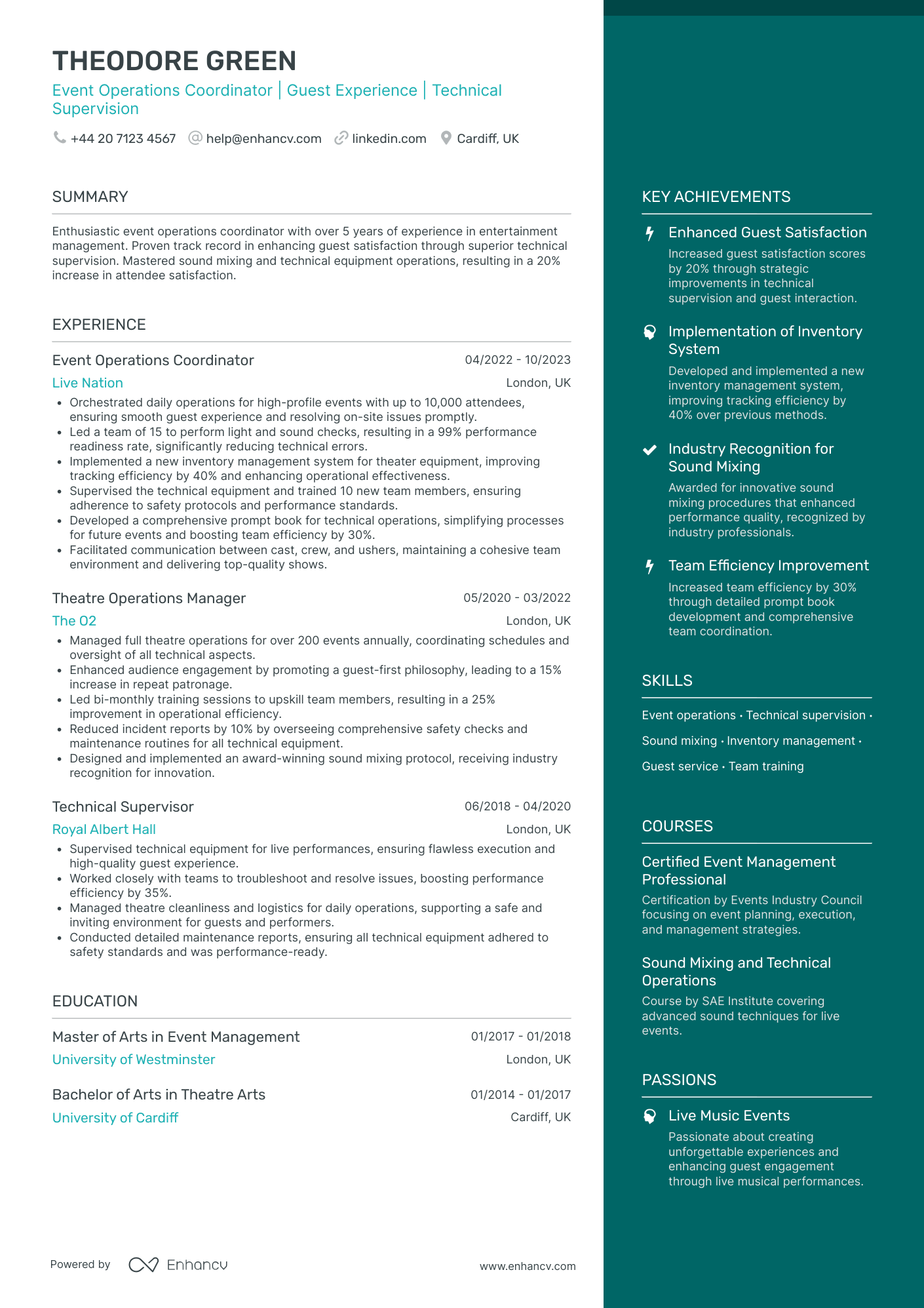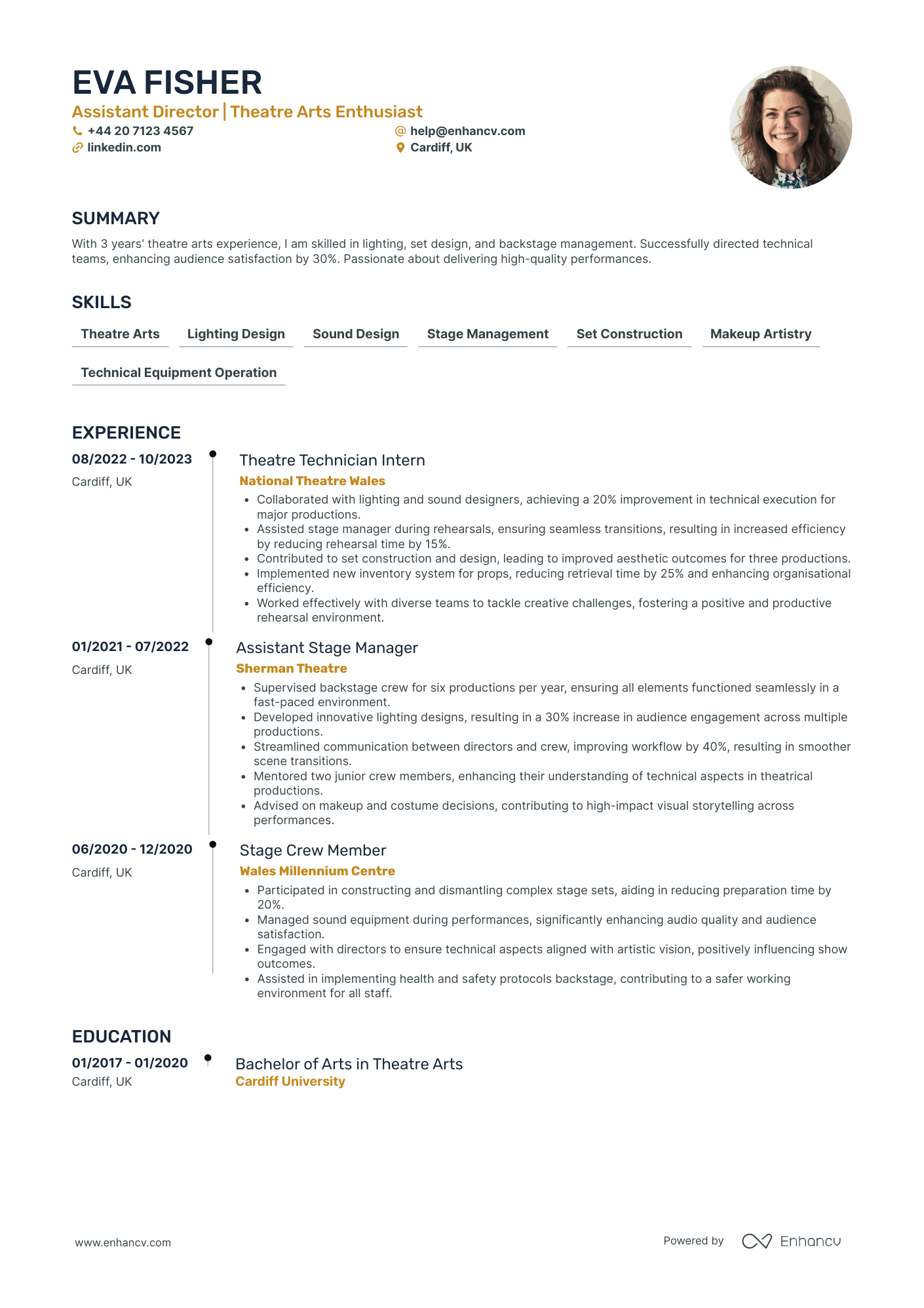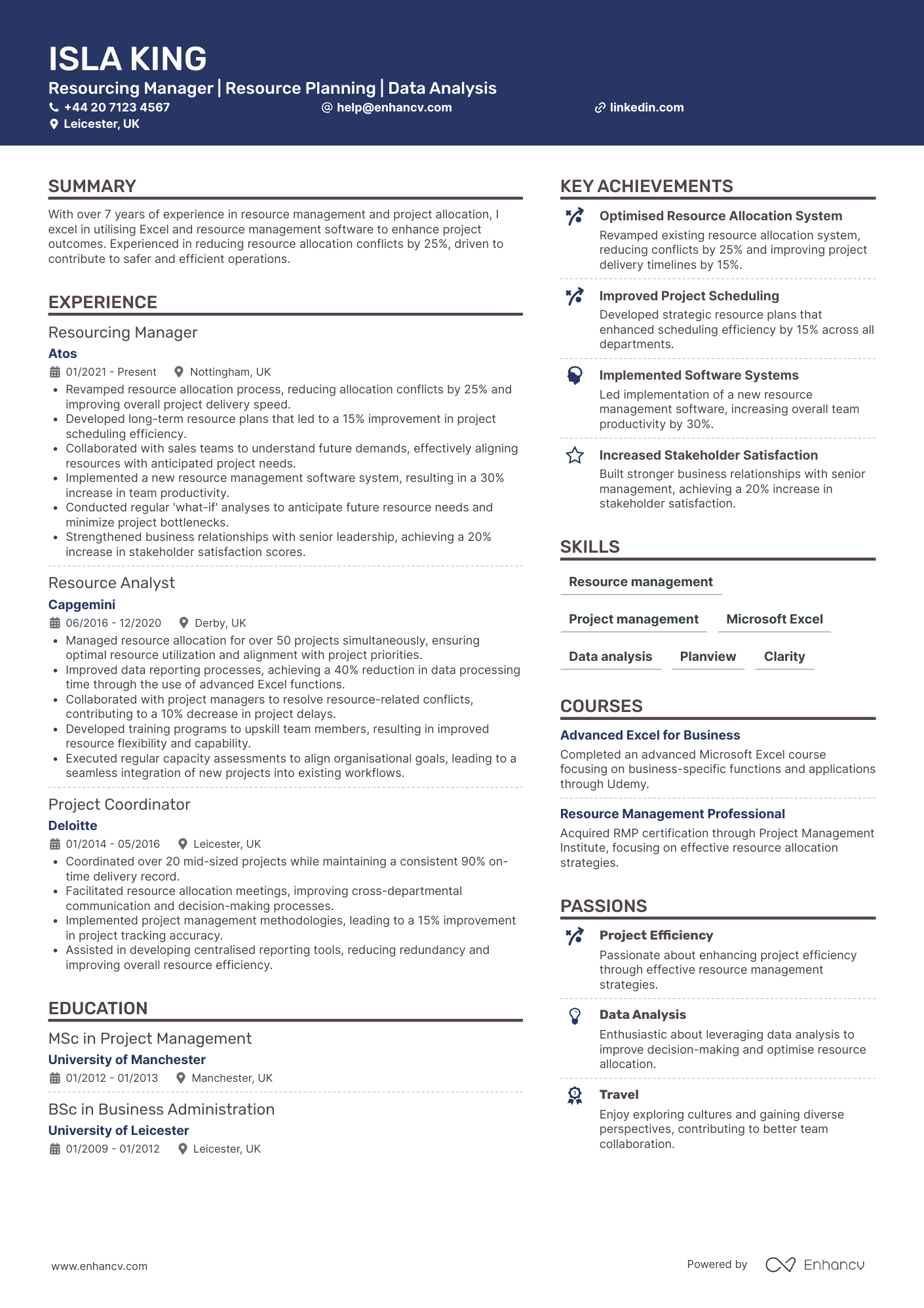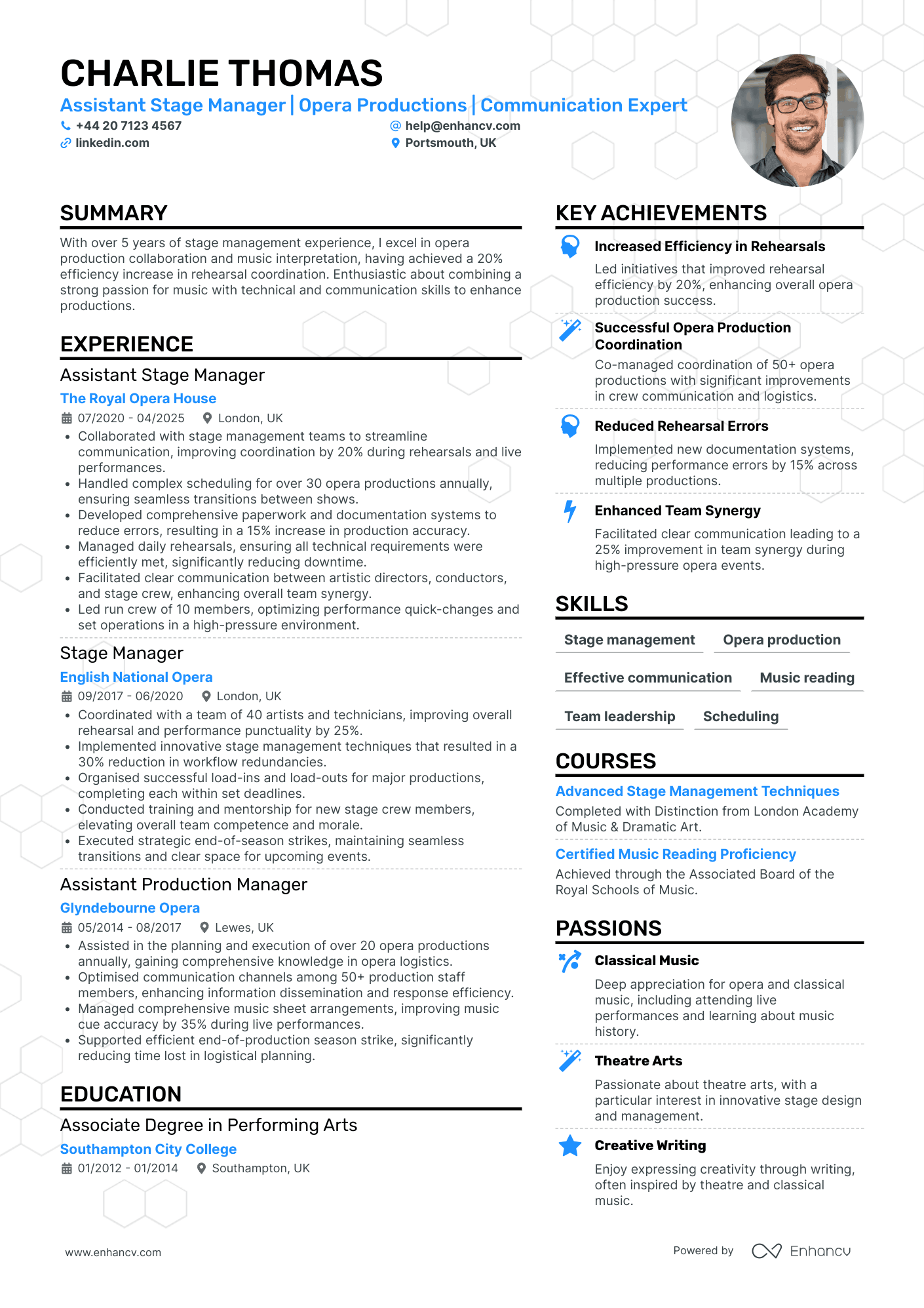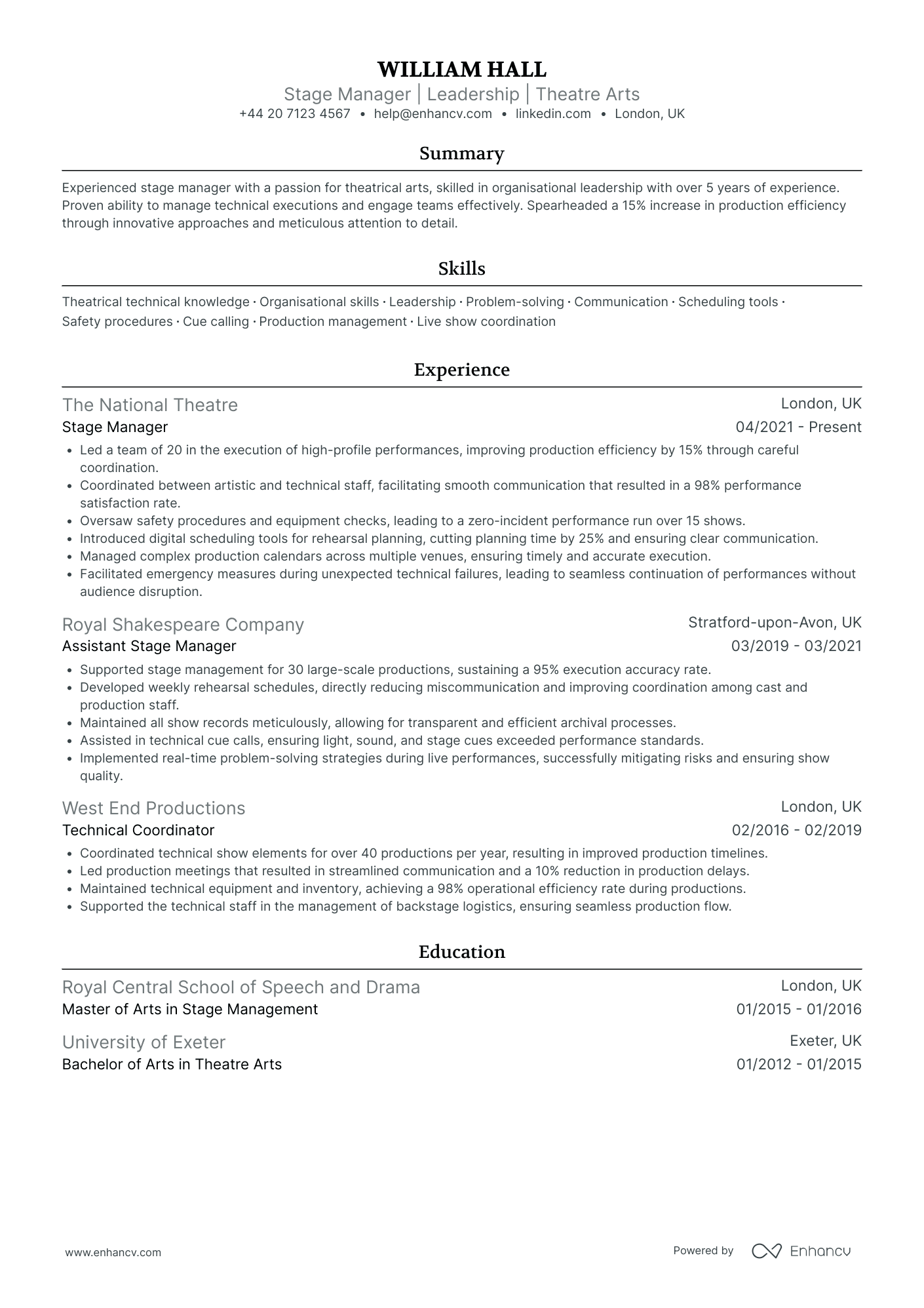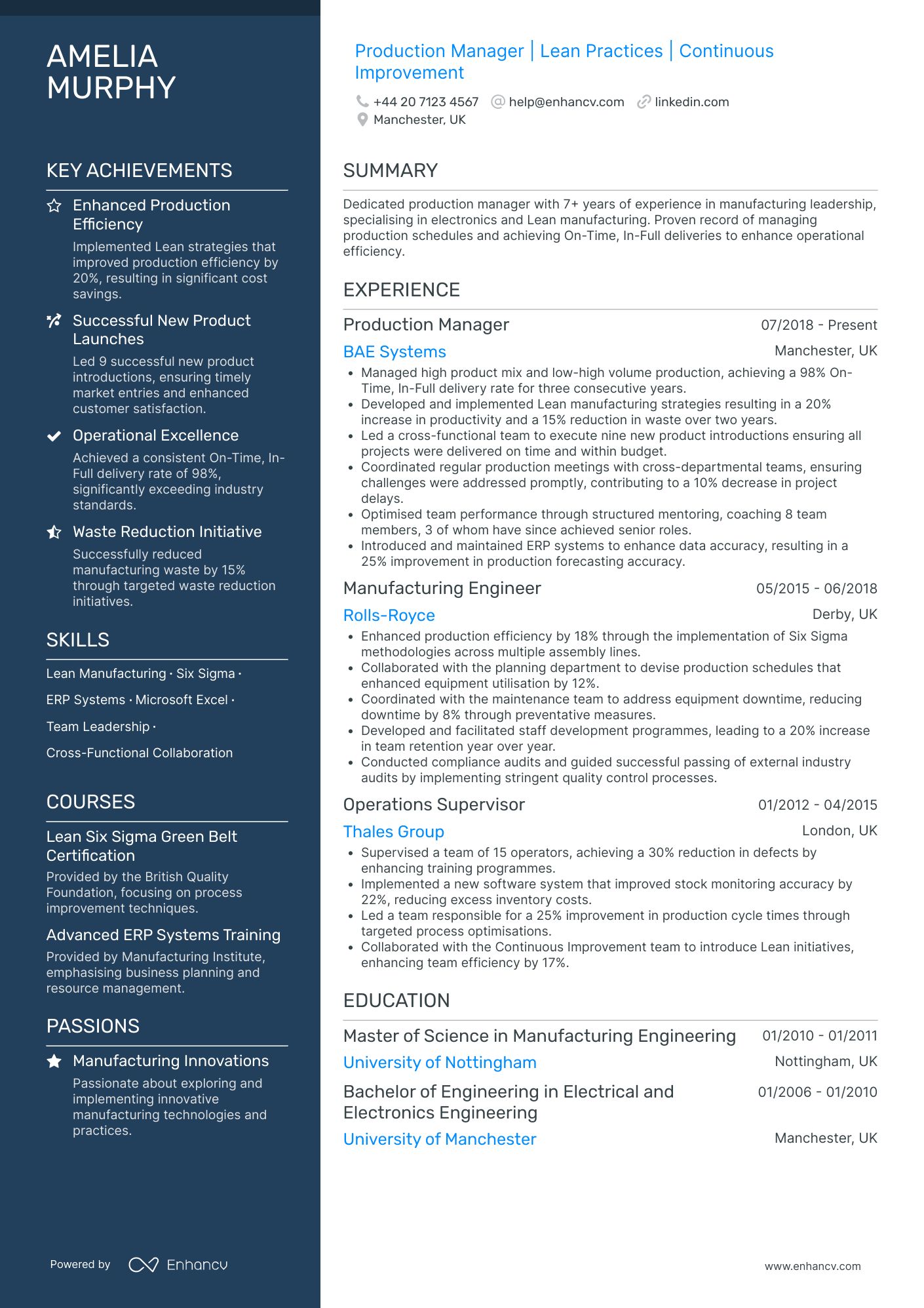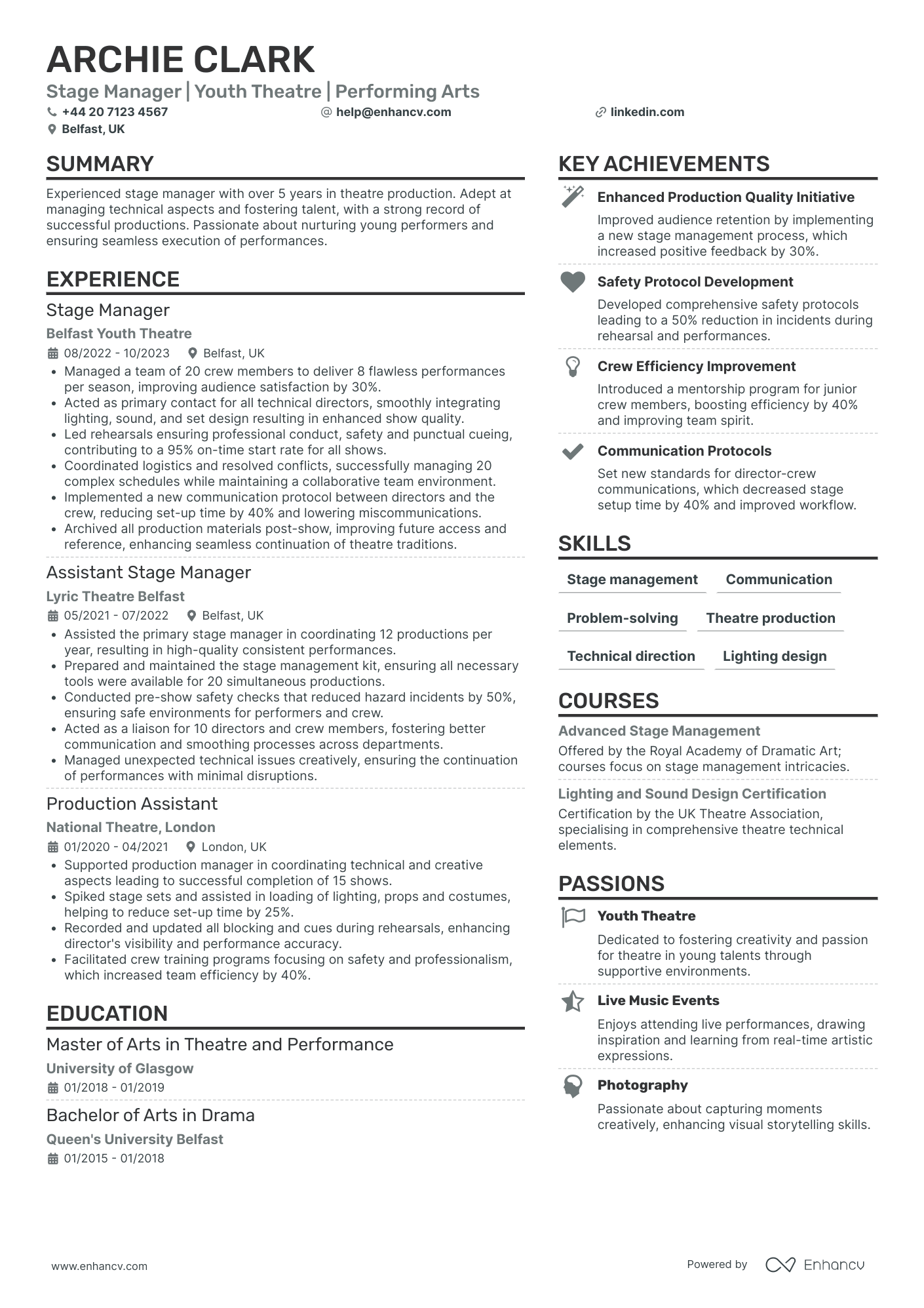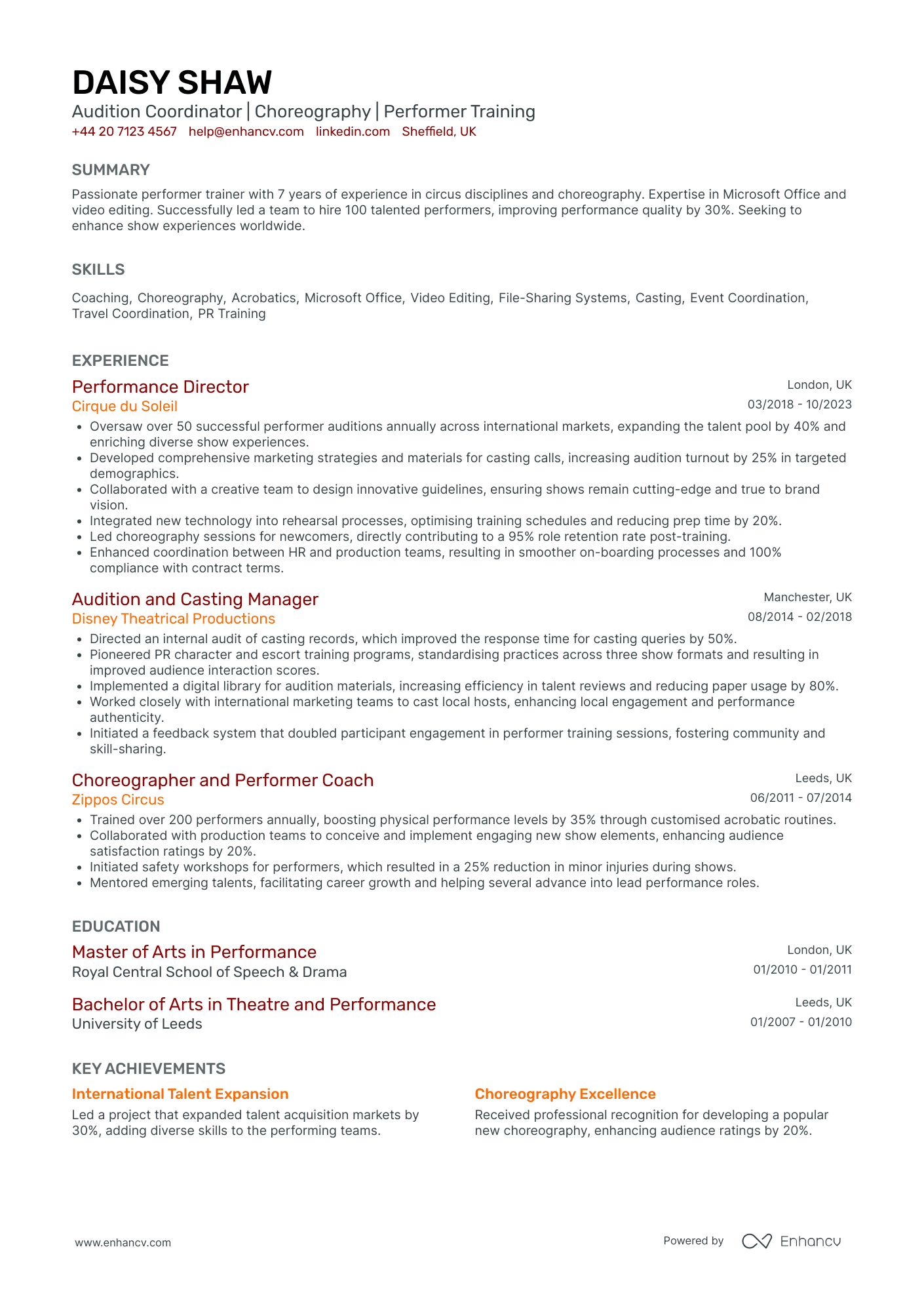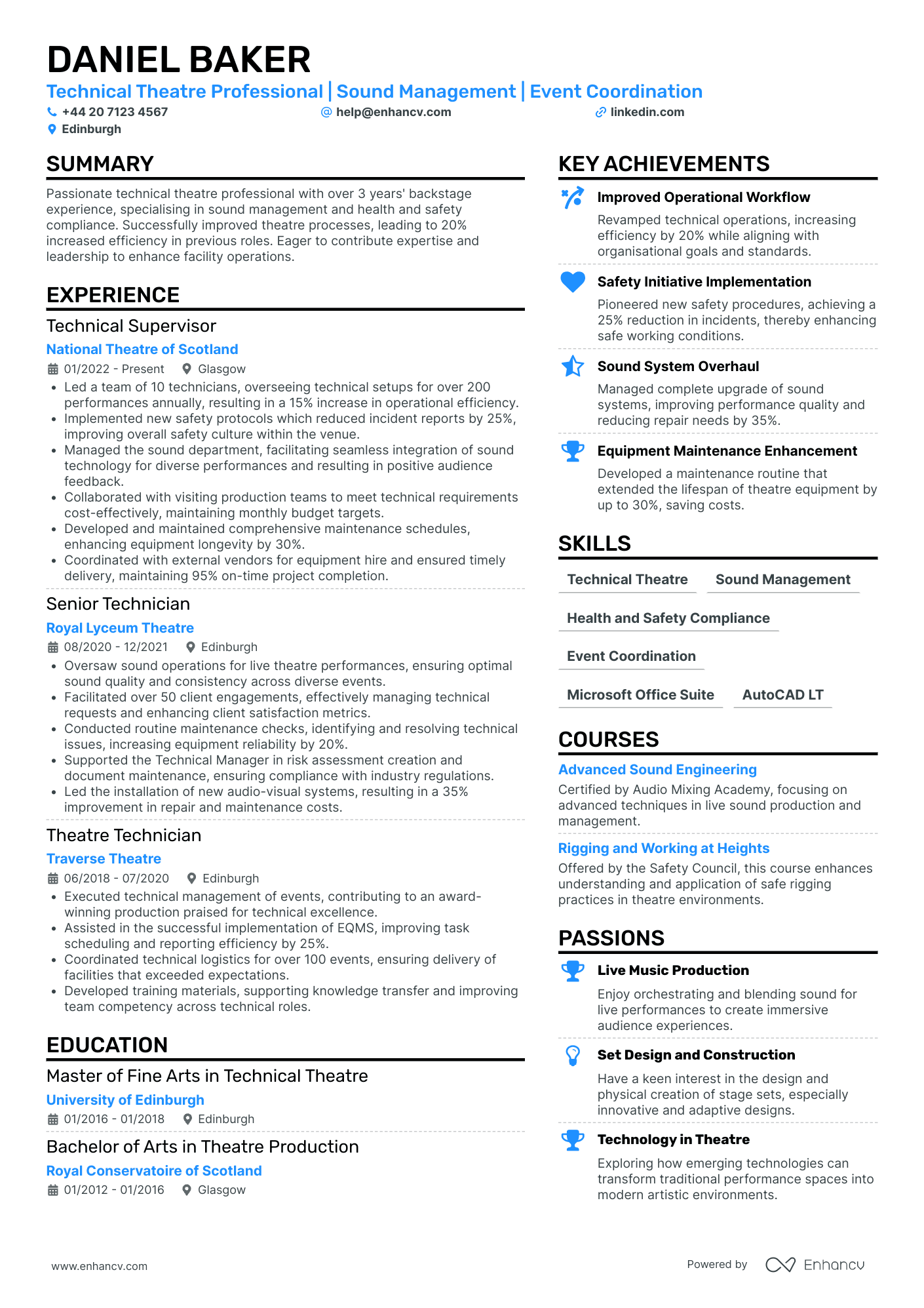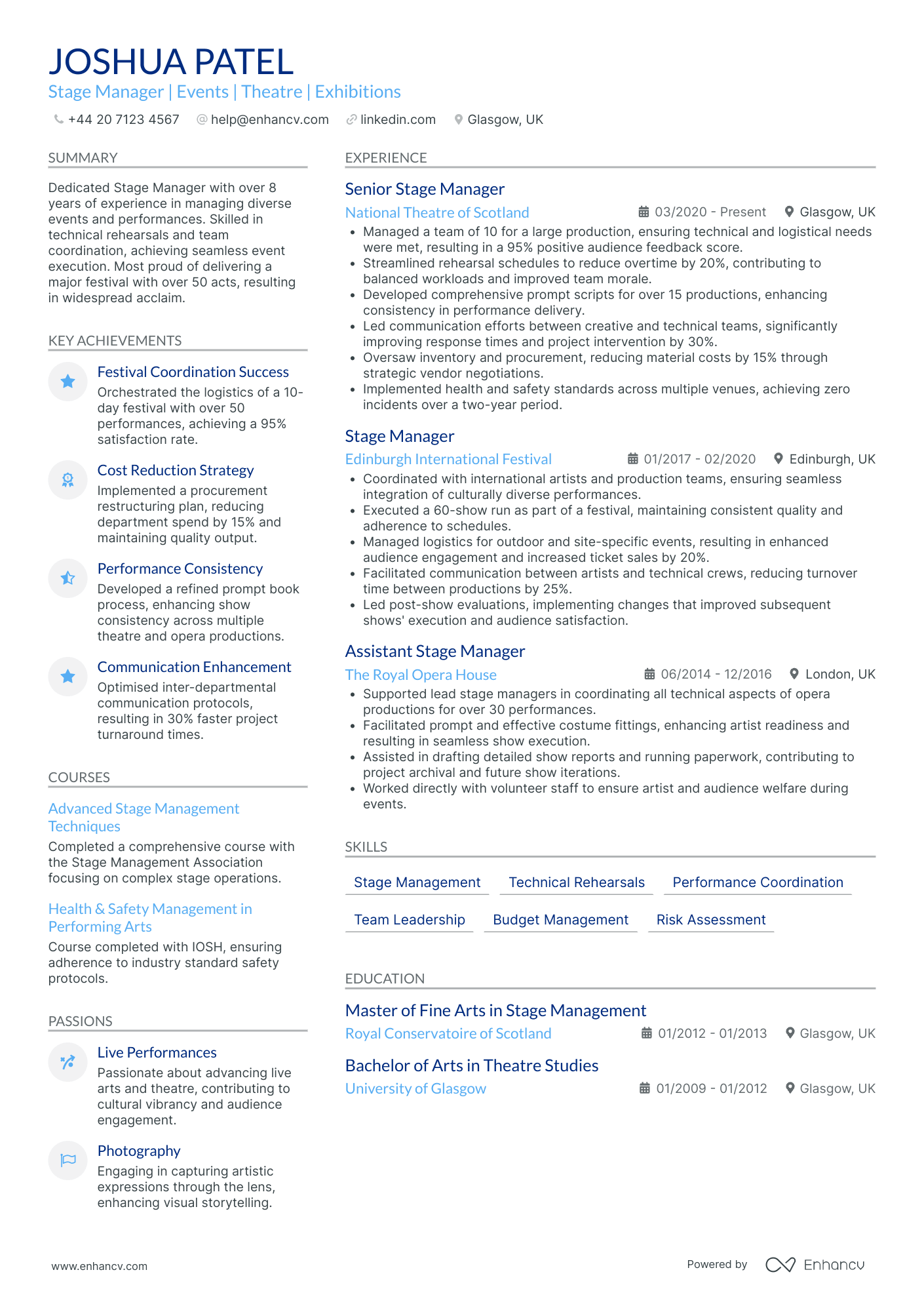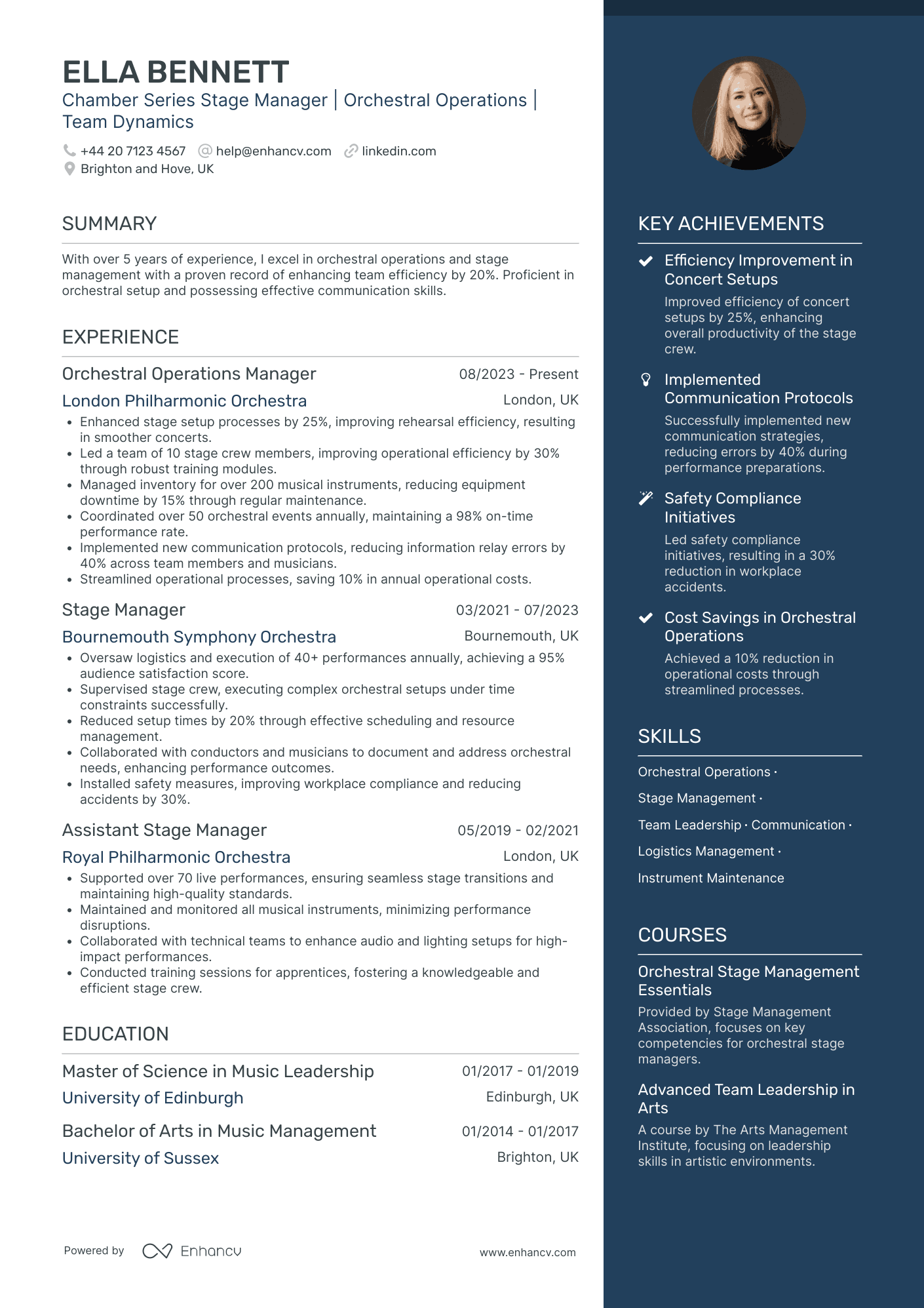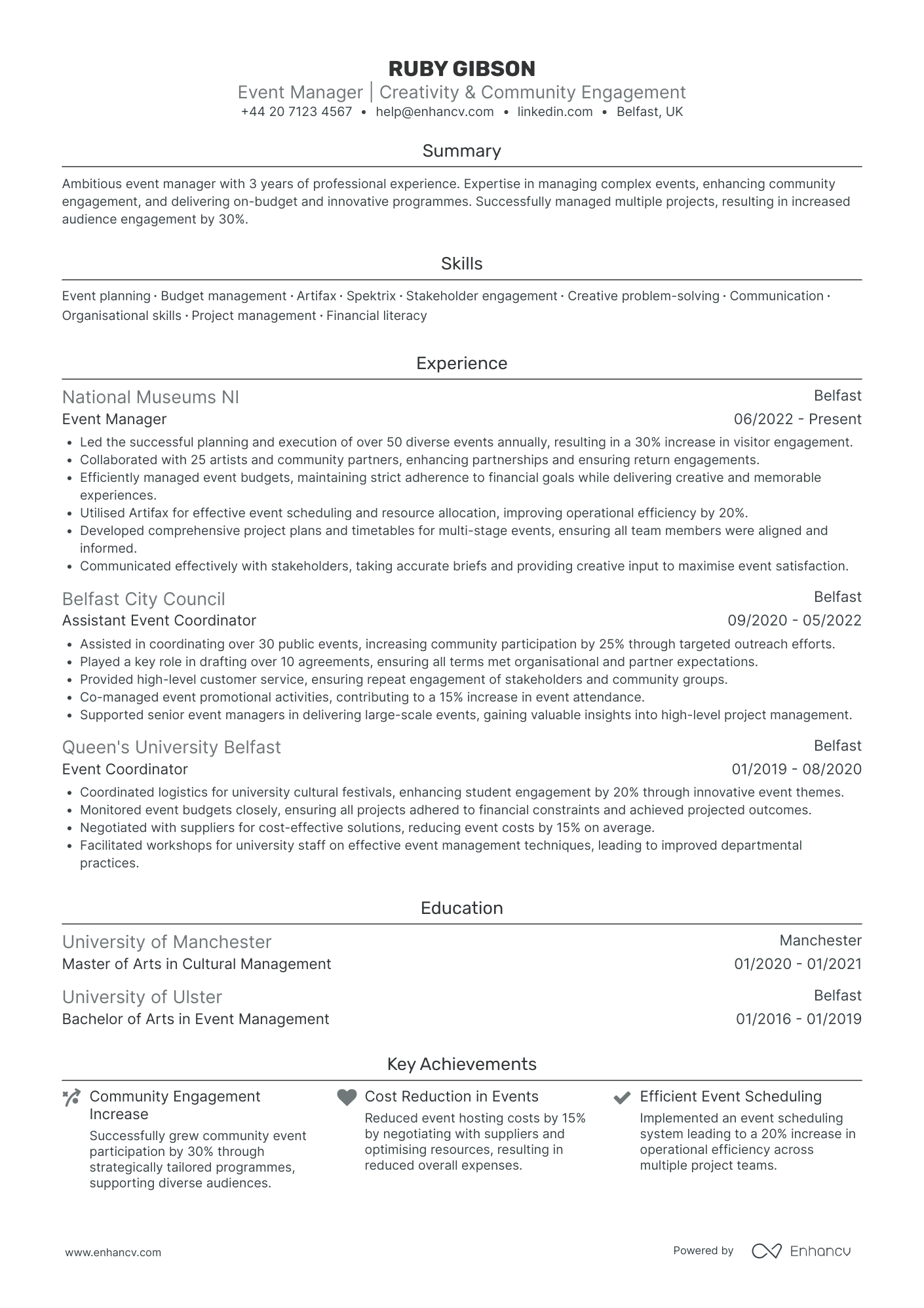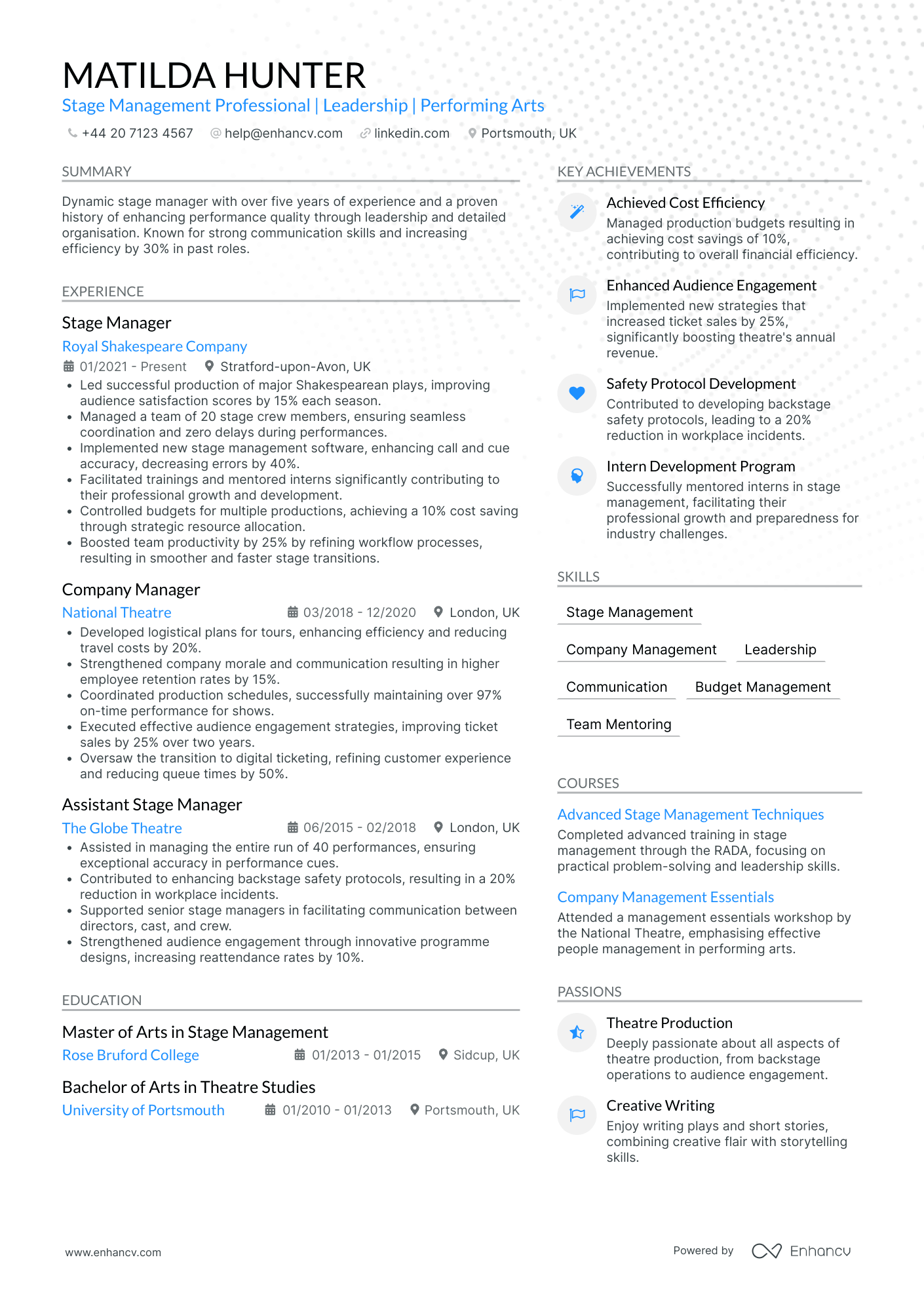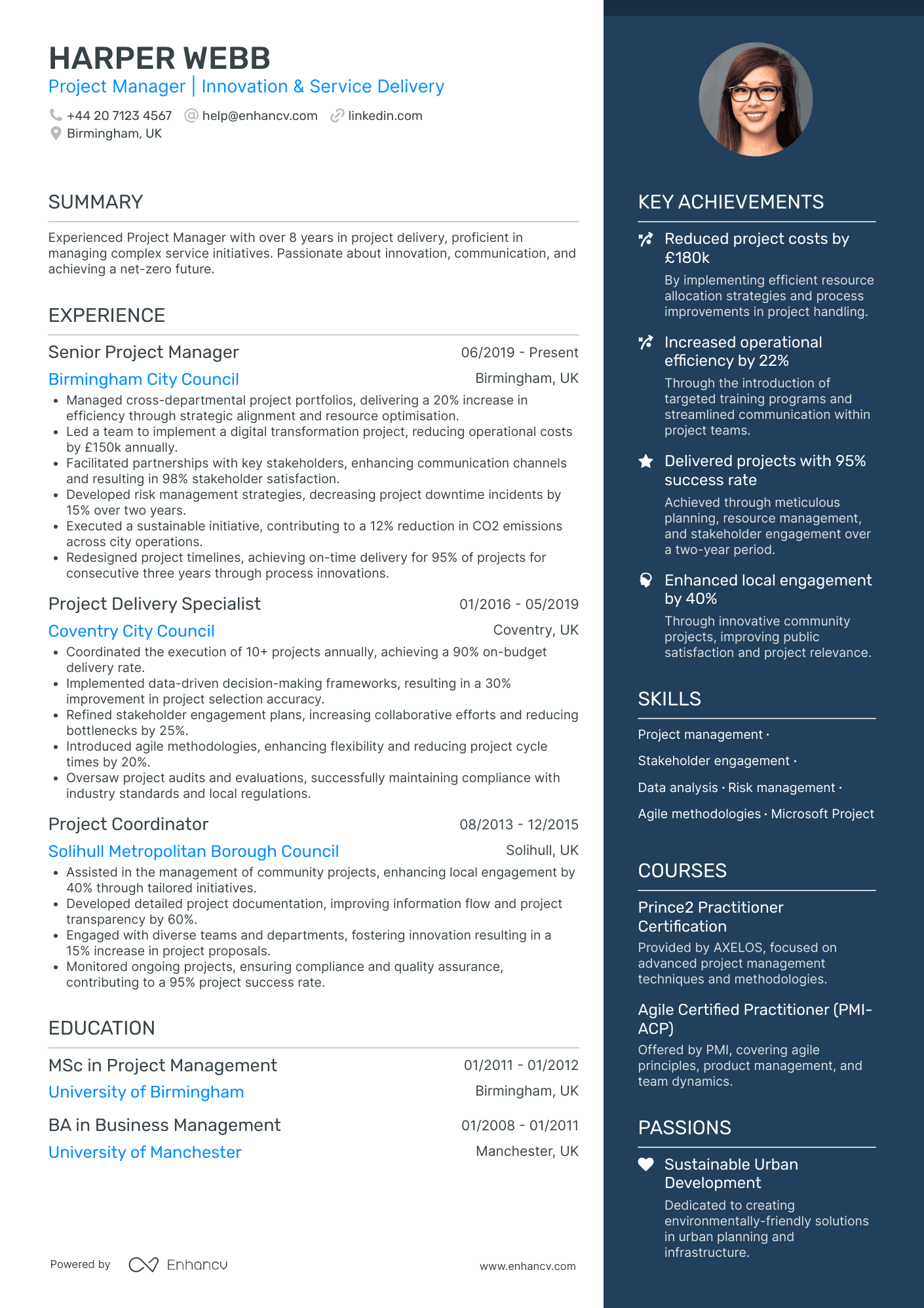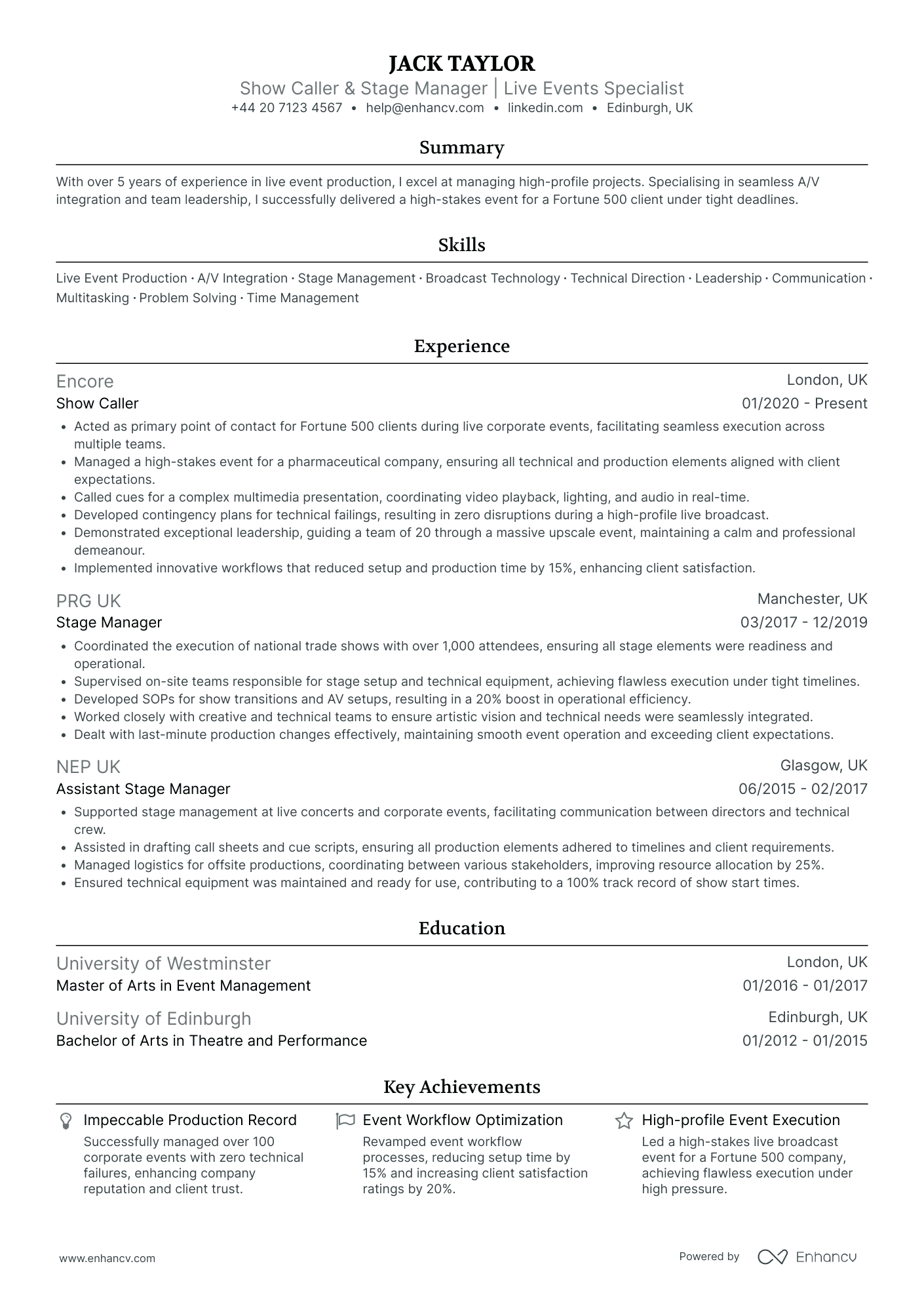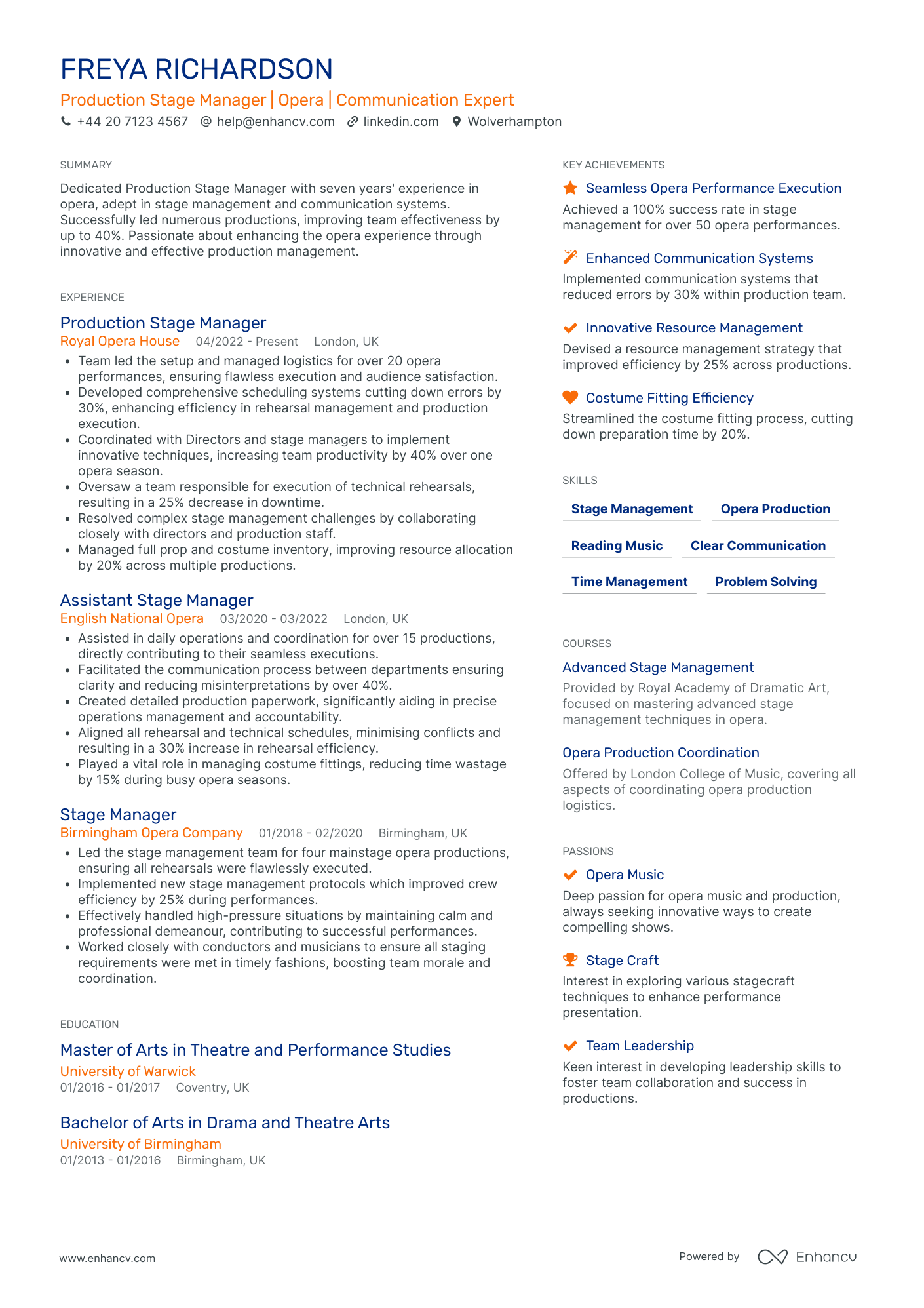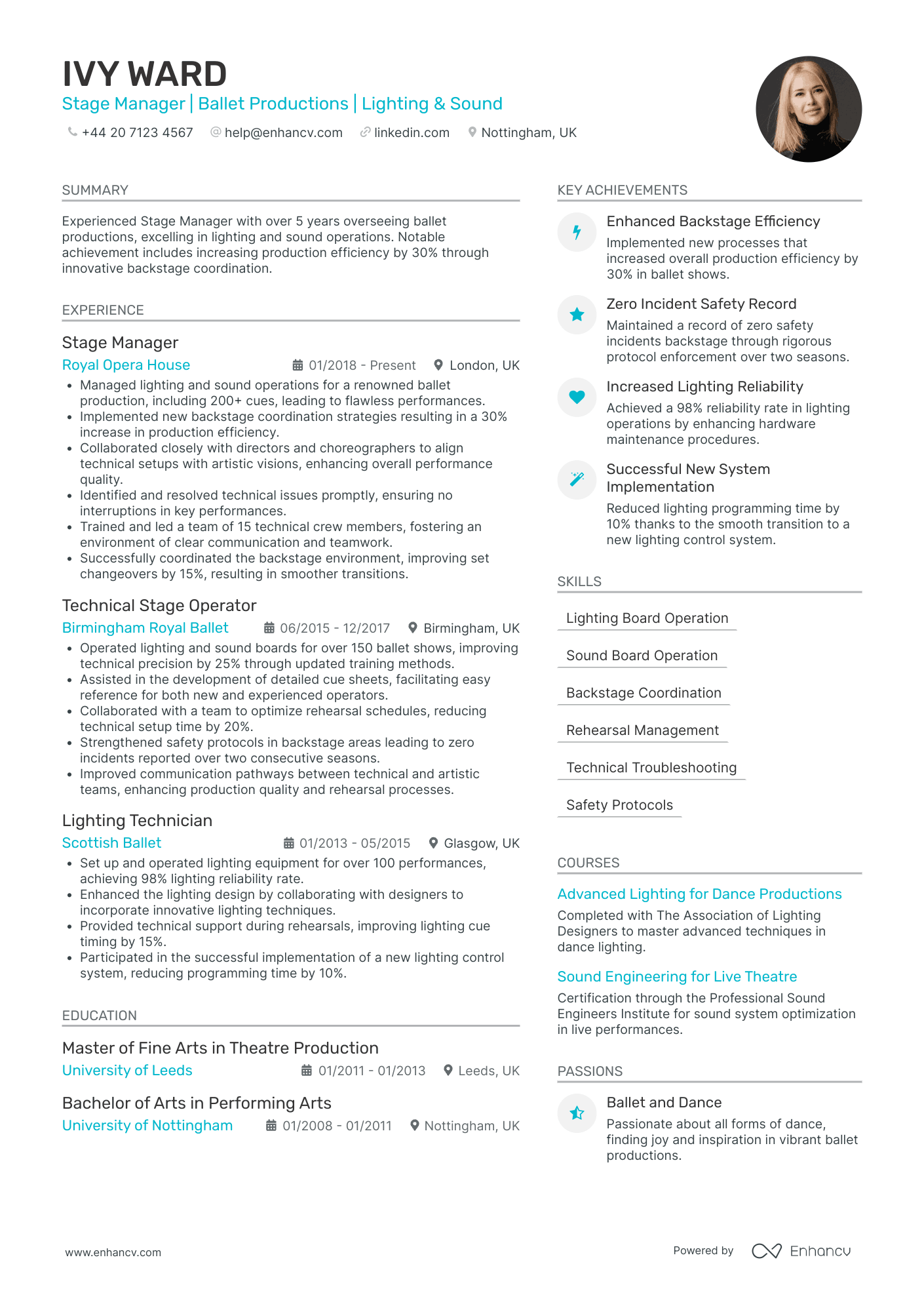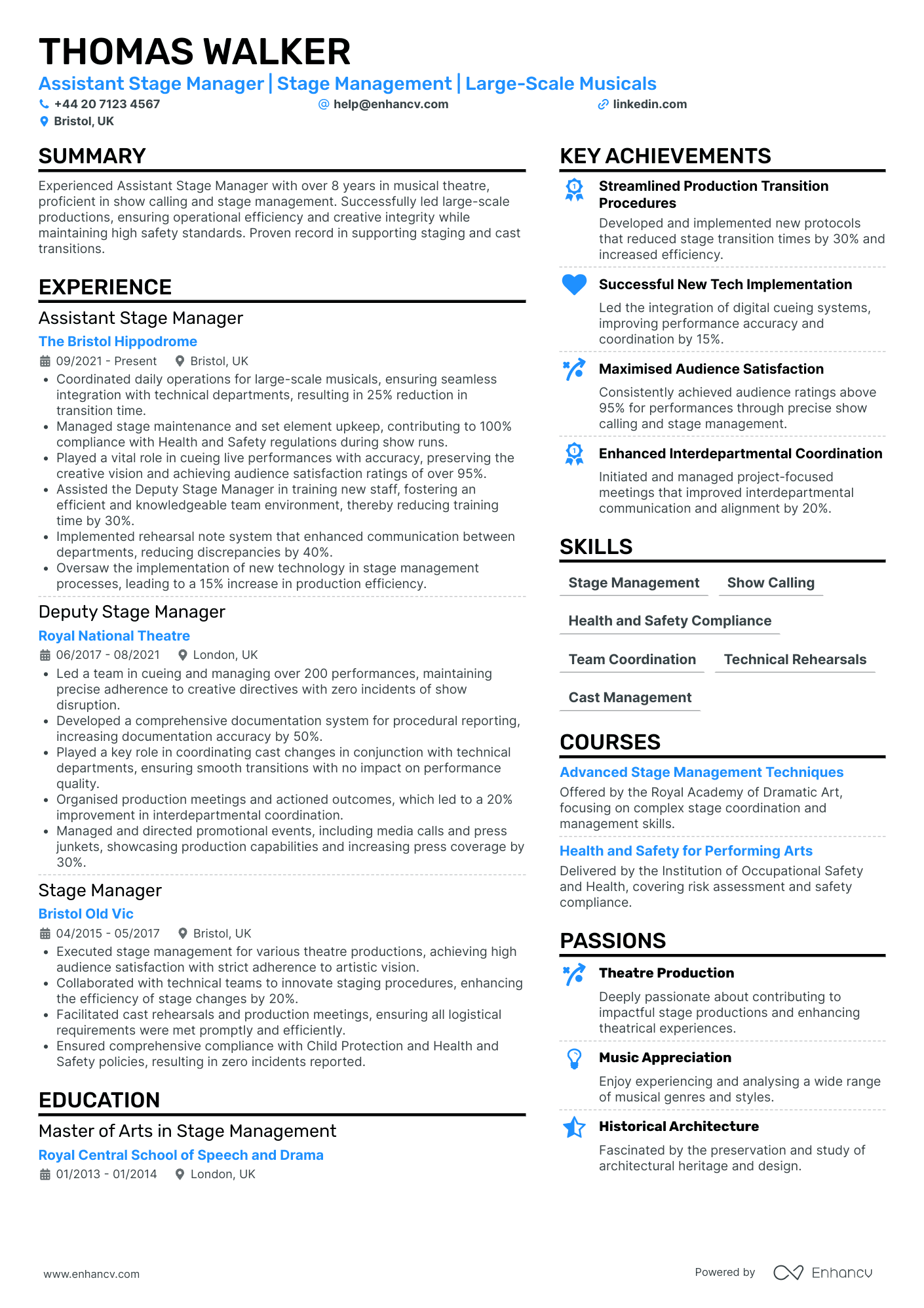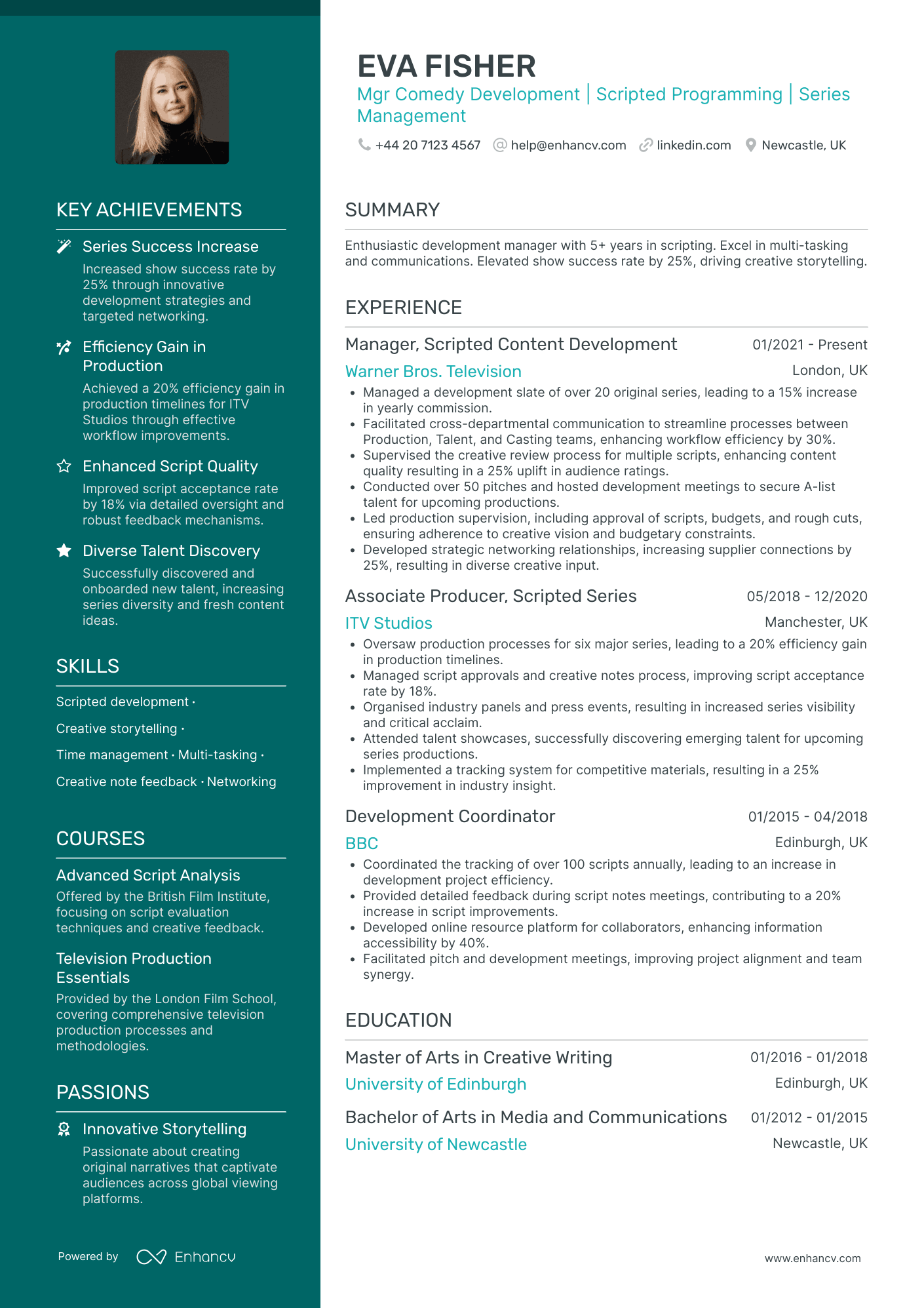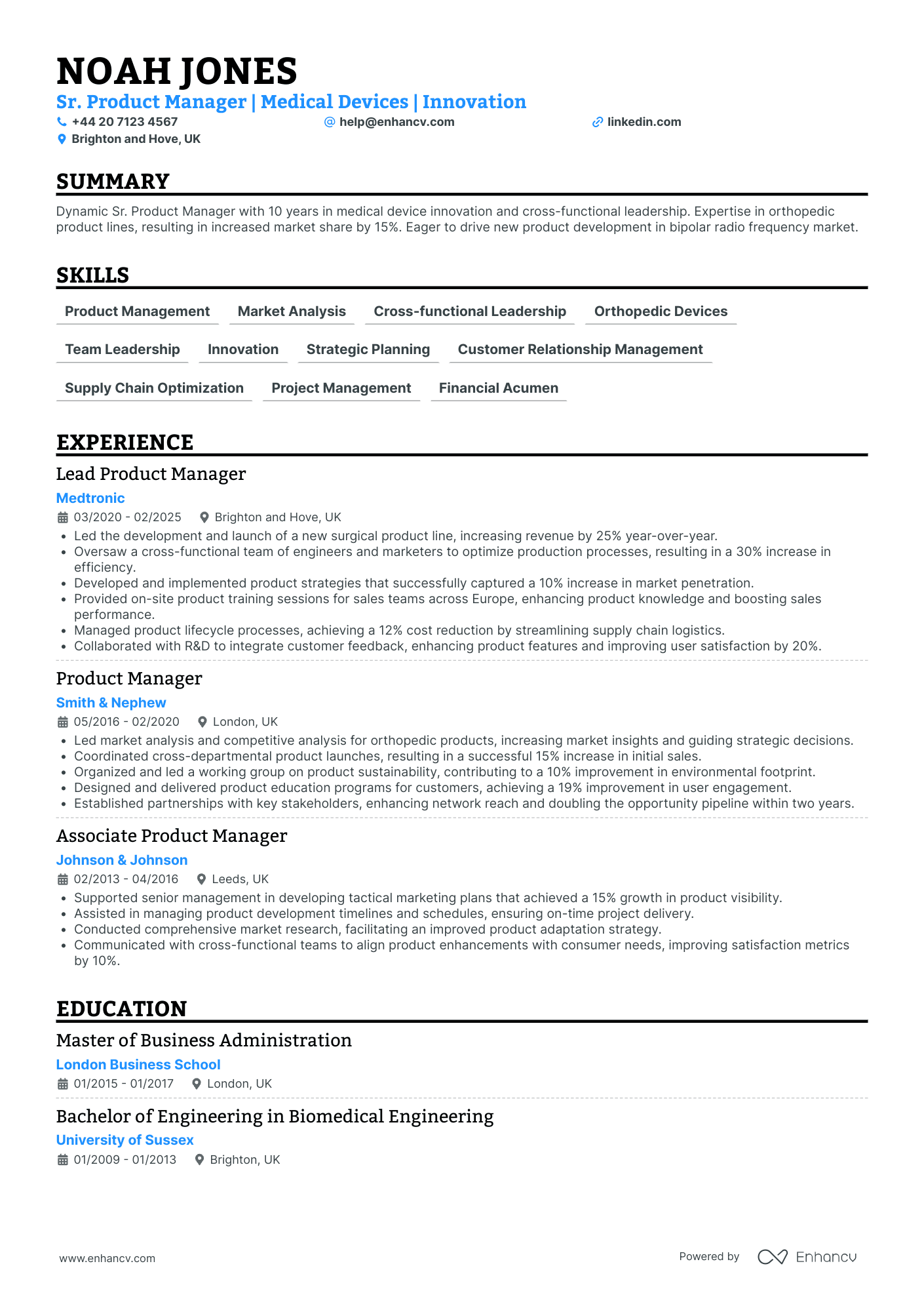Crafting a CV that effectively showcases your diverse skill set and experience in managing live productions can be quite daunting for a stage manager. Our comprehensive guide will provide you with tailored strategies to highlight your industry-specific talents, ensuring that your application stands out to potential employers.
- Applying best practices from real-world examples to ensure your profile always meets recruiters' expectations;
- What to include in your work experience section, apart from your past roles and responsibilities?
- Why are both hard and soft skills important for your application?
- How do you need to format your CV to pass the Applicant Tracker Software (ATS) assessment?
If you're writing your CV for a niche stage manager role, make sure to get some inspiration from professionals:
Resume examples for stage manager
By Experience
Senior Stage Manager
- Structured Content Presentation - The CV is well-organized and easy to read, with clearly defined sections such as experience, education, skills, and achievements. Each section is concise yet informative, providing a comprehensive overview of the candidate's qualifications and experience without overwhelming the reader.
- Demonstrated Career Growth and Adaptability - The candidate's career trajectory showcases steady growth, with each role building upon the previous one. Starting as a Technical Supervisor and progressing to Theatre Operations Manager and then to Event Operations Coordinator, there is clear evidence of skill enhancement and increasing responsibilities, reflecting a capacity for growth and adaptability in dynamic environments.
- Focus on Impactful Achievements - The CV highlights achievements with both qualitative and quantitative evidence, such as implementing an inventory system that improved tracking efficiency by 40% and increasing team efficiency by 30%. These achievements underscore the candidate’s ability to have a significant business impact, not merely through operational enhancements but by improving overall organizational effectiveness.
Junior Stage Manager
- Strong Career Trajectory in Theatre Arts - Eva Fisher's CV showcases a clear progression from a stage crew member to an assistant director role. Each position demonstrates a substantial increase in responsibilities and skills acquisition, highlighting her commitment to advancing in the theatre arts industry. Her experience shows a steady climb in leadership roles, moving from technical proficiency to managing and mentoring teams.
- Unique Technical Expertise and Methodologies - The CV notably emphasizes Eva's technical prowess in lighting, sound, and set design, which are critical elements in theatre production. Her involvement with advanced inventory systems and health and safety protocols underscores her depth of knowledge and innovation in operational management. These skills set her apart in a creative field that demands both artistic and technical expertise.
- Impactful Achievements with Business Relevance - Eva's achievements extend beyond mere responsibilities, demonstrating significant business impacts such as a 30% increase in audience engagement and enhanced ticket sales by 25%. These accomplishments illustrate her ability to translate technical skills into tangible business outcomes, making her a valuable asset to any theatre company focused on growth and audience satisfaction.
Professional Stage Manager
- Clear and Structured Presentation - The CV is meticulously organized, beginning with a succinct summary and flowing seamlessly through sections such as experience, education, skills, and achievements. This clarity facilitates a smooth reading experience, allowing prospective employers to easily identify key information relevant to the resource planning and data analysis roles.
- Progressive Career Trajectory - Isla King’s career path demonstrates significant upward movement, reflecting growth in responsibility and expertise. Starting as a Project Coordinator and advancing to Resourcing Manager, the CV showcases a consistent climb up the professional ladder within reputable companies, highlighting a robust and upward career trajectory within the resource management domain.
- Diverse Tool Proficiency and Methodologies - The CV details a comprehensive range of tools and resource management systems, such as Microsoft Excel, Planview, and Salesforce, emphasizing Isla's technical depth. This showcases her ability to leverage industry-specific methodologies and cutting-edge technologies to optimize project outcomes and efficiency, crucial for a Resourcing Manager role.
By Role
Assistant Stage Manager
- Sector-Specific Expertise and Methodologies - This CV uniquely highlights significant industry-specific skills in opera production and stage management. It places a strong emphasis on methodologies such as communication streamlining and error reduction systems, showcasing the candidate’s ability to optimize complex processes specific to the world of opera and theatre productions.
- Achievements Translate Directly to Business Impact - The CV goes beyond listing achievements by tying them back to tangible business outcomes. For instance, the improved efficiency in rehearsal coordination and reductions in production errors reflect substantial enhancements in operational effectiveness and teamwork, demonstrating the candidate’s direct contribution to smoother opera productions.
- Comprehensive Skills and Multidisciplinary Proficiency - The inclusion of diverse competencies from stage management to sound design illustrate the candidate’s multidisciplinary proficiency. The CV emphasizes not only technical skills but also effective communication, team leadership, and scheduling, demonstrating a well-rounded capability essential for managing complex theatre productions.
Deputy Stage Manager
- Clear Structure and Conciseness - The CV is well-organized, allowing easy navigation through sections like experience, education, and skills. Each section provides concise information that highlights William Hall's capabilities and achievements without unnecessary detail, making the document efficient and reader-friendly.
- Strong Career Progression - William's career trajectory shows significant growth with progressive roles at prestigious institutions like The National Theatre and Royal Shakespeare Company. His promotion from Assistant Stage Manager to Stage Manager illustrates his increasing responsibilities and expertise within the theatrical production industry.
- Industry-Specific Technical Knowledge - The CV details William's proficiency in stage management tools and methodologies, such as digital scheduling and cue management, highlighting his technical depth. His implementation of new technologies demonstrates both industry-specific knowledge and a proactive approach to problem-solving.
Stage Production Manager
- Impressive Career Growth and Industry Engagement - Amelia Murphy's career trajectory demonstrates a clear pattern of growth and increased responsibility, from Operations Supervisor at Thales Group to Production Manager at BAE Systems. This trajectory highlights a strong commitment to advancing in the aerospace and electronics manufacturing sectors, showcasing her ability to handle increasingly complex roles and responsibilities.
- Effective Leadership and Team Development - The CV emphasizes Amelia's leadership qualities through her ability to mentor and develop team members, with three team members achieving senior roles under her guidance. Her leadership skills are further reinforced by her coordination of cross-functional teams and execution of projects within budget and timeframes, indicating her capability to inspire and lead teams to success.
- Specialization in Lean Practices and Continuous Improvement - Amelia's proficiency in lean manufacturing and continuous improvement is a standout element in her CV. With a Six Sigma Green Belt certification and a history of implementing lean strategies that enhanced productivity, her technical depth and commitment to operational excellence are evident. Her initiatives have led to significant efficiency gains and waste reductions, underscoring her expertise in driving impactful business results.
Theatre Stage Manager
- Strategic Career Progression - The CV showcases a well-mapped career trajectory emphasizing strategic advancements. Transitioning from junior roles in web development to senior leadership positions, the candidate has successfully navigated industry shifts while maintaining a focus on front-end technologies and team management.
- Comprehensive Skillset with Technical Nuance - The candidate’s proficiency in unique, industry-specific tools is evident through their expertise in modern frameworks like React and Angular, along with methodical approaches such as Agile and Scrum. Their technical depth not only demonstrates proficiency but also a command over leading-edge development practices.
- Cross-functional Collaboration and Leadership - Highlighted through active participation in cross-departmental projects, the CV presents an adaptable professional who excels in diverse environments. The inclusion of roles where they steered successful product launches underscores strong collaboration and leadership abilities, critical for navigating complex projects effectively.
Touring Stage Manager
- Structured Content Presentation - The CV provides a well-organized view of Daisy Shaw’s experiences, skills, and achievements. She uses clear headings and concise lists that make it easy to navigate through her professional history, ensuring prospective employers can quickly identify her key qualities and accomplishments.
- Dynamic Career Trajectory - Daisy shows a strong upward career progression from a Choreographer and Performer Coach to a Performance Director at Cirque du Soleil. Each role builds on the previous, demonstrating her advancement in responsibility and leadership within the performing arts industry.
- Industry-Specific Expertise - The CV reflects Daisy's unique knowledge of integrating technology into rehearsal processes, her ability to develop comprehensive marketing strategies for auditions, and her proficiency in Microsoft Office and video editing. These skills highlight her technical depth in enhancing performance training and casting operations, key to her roles.
Technical Stage Manager
- Clear and Engaging Format - The CV's content is presented with clarity and structure, beginning with a succinct summary followed by well-organized sections. This ensures that the reader can quickly grasp key information, such as professional experience and skills, without unnecessary complexity, enhancing the overall readability and impact.
- Progressive Career Development - Daniel's career growth is clearly highlighted, showing a transition from a Theatre Technician role to a Technical Supervisor. This trajectory demonstrates increased responsibilities, capacity for leadership, and a commitment to advancing within the field of technical theatre.
- Use of Industry-Specific Tools and Techniques - The CV emphasizes Daniel’s proficiency with specialized tools and methodologies such as AutoCAD LT, EQMS, LOLER, and PUWER. This technical depth is crucial in theatre environments, indicating not only familiarity but also mastery with industry-specific technologies that drive operational success.
Freelance Stage Manager
- Structured Career Development - Joshua Patel's CV illustrates a clear progression in his stage management career, moving from an Assistant Stage Manager role at The Royal Opera House to a Senior Stage Manager position at the National Theatre of Scotland. This career trajectory highlights his ambition and the recognition of his skills within the industry, signifying a steady growth in responsibilities and leadership.
- Technical and Methodological Proficiency - The CV demonstrates Patel's depth in stage management, with specific mention of tools and methodologies such as streamlined rehearsal schedules and comprehensive prompt scripts. His ability to manage logistics, reduce overtime, and enhance performance consistency underscores a technical competence that is vital in managing complex productions.
- Impactful Achievements with Business Relevance - It is particularly noteworthy that Patel has made significant contributions that have tangible business impacts, such as reducing material costs by 15% and increasing ticket sales by 20% during his tenure at the Edinburgh International Festival. These achievements not only emphasize his operational efficiency but also his ability to positively affect an organization's bottom line by optimizing resources and enhancing audience engagement.
By Industry
Concert Stage Manager
- Effective Content Presentation - The CV excels in clarity and structure, presenting information in an organized manner that is easy to follow. Each section is concisely written, allowing readers to quickly grasp key skills, experiences, and achievements relevant to the role. The use of bullet points enhances readability and helps emphasize crucial accomplishments.
- Demonstrated Career Progression - There is a clear trajectory of growth in Ella Bennett's career, showcasing their progression from Assistant Stage Manager to Orchestral Operations Manager. This demonstrates a consistent rise in responsibility and expertise, reflecting a commitment to professional development within the orchestral operations field.
- Impactful Achievements - The CV highlights specific achievements with significant business relevance, such as improving operational efficiency by 30% and reducing equipment downtime by 15%. These metrics not only illustrate Ella Bennett's ability to enhance productivity but also demonstrate their direct impact on organizational success.
Event Stage Manager
- Structured Career Progression - Ruby Gibson's career trajectory is marked by clear growth within event management positions, showcasing advancement from an Event Coordinator to an Event Manager over a few years. This progression indicates her capability to take on increased responsibilities and leadership roles in the field of event management.
- Utilization of Industry-Specific Tools - The CV highlights Ruby's expertise in using specialized tools like Artifax and Spektrix, which demonstrates her technical acumen and ability to leverage technology for efficient event planning and resource management. This is a crucial skill in modern event management, where precision and efficiency are key.
- Emphasis on Community Engagement - Ruby's achievements in boosting community engagement by 30% underline her strength in fostering connections and enhancing the reach of events. This focus on increasing public participation demonstrates her ability to create impactful events that resonate with diverse audiences, aligning with the role's requirements in enhancing community engagement.
Festival Stage Manager
- Career Progression and Leadership Development - The CV clearly outlines a strong career trajectory, demonstrating consistent growth from an Assistant Stage Manager at The Globe Theatre to a Stage Manager at the prestigious Royal Shakespeare Company. This progression underscores the individual's capability in taking on greater responsibilities and enhancing leadership skills, as seen in the management and mentorship of stage crews and interns.
- Innovative Use of Industry-Specific Tools - Throughout the CV, there are numerous mentions of implementing and utilizing stage management software, contributing to significant improvements in operational efficiency and accuracy. This showcases the candidate's technical acumen and ability to stay up-to-date with emerging industry tools and methodologies that enhance overall production quality.
- Soft Skills and Effective Communication - The CV underscores strong communication skills and highlights instances of improving team efficiency and morale. Through effective audience engagement strategies and seamless crew coordination, the candidate showcases a well-rounded capability to mediate between different stakeholders, ultimately leading to enhanced performance quality and audience satisfaction.
Performance Stage Manager
- Content presentation: Clear and Structured - The CV is presented with a clear structure, starting with personal details, followed by a concise summary, and ordered sections for experience, education, skills, courses, achievements, languages, and passions. This ensures easy readability and allows a recruiter to quickly ascertain the candidate's qualifications and expertise relevant to the project management role.
- Career trajectory: Diverse Growth in Public Sector - Harper Webb's career progression from Project Coordinator to Senior Project Manager within local councils highlights significant professional growth, demonstrating their capability to take on increasingly complex and impactful roles. Their strategic move from Coventry to Birmingham reflects a pursuit of larger-scale projects and a dedication to urban development.
- Achievements and Business Impact - The CV emphasizes Harper Webb’s impact on business through achievements such as a £150k annual cost reduction and a 12% CO2 emission reduction. These not only quantify success but also underline their commitment to sustainable practices and fiscal responsibility, which are crucial for innovation-driven project management and align with their passion for sustainable urban development.
Live Show Stage Manager
- Structured progression in roles and responsibilities - Jack Taylor's CV demonstrates a clear upward trajectory in their career. Starting as an Assistant Stage Manager and progressing to roles with increased responsibility as a Stage Manager and then Show Caller, the CV highlights consistent growth within the live events industry, showcasing an expansion of both technical and leadership responsibilities.
- Rich integration of technical and leadership skills - The CV effectively combines industry-specific technical competencies like A/V integration and broadcast technology with essential soft skills such as leadership, communication, and problem-solving. This blend highlights Taylor's capability to manage complex projects while nurturing team dynamics for successful live event execution.
- Notable achievements with tangible business impact - The CV emphasizes significant accomplishments that directly impact business outcomes. For instance, implementing innovative workflows led to a 15% reduction in setup time and a 20% increase in client satisfaction, while managing over 100 events without technical failures underscored a strong track record and enhanced client trust.
Opera Stage Manager
- Clear Content Presentation - The CV is structured logically with clear headings for each section, enhancing readability. Key responsibilities and achievements are expressed concisely, making it straightforward for potential employers to recognize the candidate's value quickly.
- Career Trajectory and Growth - Freya's progression from a Stage Manager to a Production Stage Manager highlights a logical career development path. The timeline of roles within prestigious organizations like the Royal Opera House accentuates her growth and expertise in the opera industry.
- Unique Industry-Specific Elements - The CV highlights Freya's mastery of industry-specific methodologies such as technical rehearsals and production scheduling. Her expertise in these areas underscores her specialized skills tailored to the demands of opera production.
Ballet Stage Manager
- Clarity and Structured Presentation - Ivy Ward's CV is well-organized, presenting her career trajectory and skills in a clear and concise manner. The header provides essential information like name, location, and contact details upfront. The structured presentation of her job experiences enables easy navigation through her career achievements and expertise.
- Career Growth and Industry Focus - The CV demonstrates a strong career trajectory, moving from a Lighting Technician to a Stage Manager at prestigious establishments like Royal Opera House and Birmingham Royal Ballet. This progression underscores her growing responsibilities in managing complex technical productions and coordinating ballet performances effectively.
- Achievements and Impact on Efficiency - Ivy's achievements are not just presented in numbers, but with context on their business impact. The 30% increase in production efficiency and 25% improvement in technical precision highlight her ability to significantly optimize operations, leading to smoother performances and enhanced audience experience.
Film Stage Manager
- Progressive Career Path - The CV outlines a clear trajectory of growth, starting from a Stage Manager at Bristol Old Vic to an Assistant Stage Manager at The Bristol Hippodrome. This progression illustrates Thomas Walker's ability to take on increasing responsibilities and highlights his expertise in handling large-scale musical productions.
- Effective Content Presentation - The CV is structured neatly, with clear headers and concise bullet points. This organization ensures that key information is easily accessible, particularly the accomplishments and responsibilities that demonstrate Thomas Walker’s capabilities in stage management.
- Industry-Specific Competence - Thomas’s experience with show calling, documentation systems, and the integration of new technology in stage management processes reflects a deep understanding of industry-specific tools and methodologies. These elements underscore his capability to navigate and enhance the technical aspects of stage management effectively.
Television Stage Manager
- Structured with Clarity and Precision - The CV is thoughtfully organized, presenting each section with notable clarity, making it easy for readers to follow her professional journey. It efficiently articulates her experiences, skills, and achievements in a concise manner, ensuring the portrayal remains powerful without being verbose.
- Showcases Consistent Career Growth - Eva Fisher’s career trajectory is notable, demonstrating a clear progression from her start as a Development Coordinator to her current role as Manager of Scripted Content Development. Her movement across distinguished companies such as BBC, ITV Studios, and Warner Bros. Television signifies not only success but also her growing expertise and trust in significant industry players.
- Demonstrates Strong Leadership and Networking Skills - The CV emphasizes Eva’s strong leadership abilities, showcased through her management of creative review processes and strategic networking that led to increased connections and creative input. Her leadership is further reflected in her supervision of productions and her role in driving narrative success, enhancing the overall impact of her contributions.
Radio Stage Manager
- Structured and Focused Presentation - Noah Jones' CV is expertly structured, ensuring clarity and conciseness. Each section is well-organized, providing comprehensive yet succinct information. This not only makes it easy to follow Noah's career trajectory and skills but also highlights the relevance of each part in relation to the senior product management role.
- Impressive Career Trajectory - With a clear progression from an Associate Product Manager at Johnson & Johnson to a Lead Product Manager at Medtronic, Noah demonstrates significant career advancement. Each position shows increased responsibility and strategic impact, reflecting industry growth in medical device manufacturing and expertise in orthopedic product lines.
- Cross-Functional Leadership and Innovation - The CV places a strong emphasis on Noah's ability to lead cross-functional teams and innovate. By working with engineers, marketers, and R&D, Noah facilitated increased market penetration and product efficiency. This demonstrates adaptability and prowess in managing complex projects across different functions within an organization.
How to ensure your profile stands out with your stage manager CV format
It's sort of a Catch 22. You want your stage manager CV to stand out amongst a pile of candidate profiles, yet you don't want it to be too over the top that it's unreadable. Where is the perfect balance between your CV format simple, while using it to shift the focus to what matters most. That is - your expertise. When creating your stage manager CV:
- list your experience in the reverse chronological order - starting with your latest roles;
- include a header with your professional contact information and - optionally - your photograph;
- organise vital and relevant CV sections - e.g. your experience, skills, summary/ objective, education - closer to the top;
- use no more than two pages to illustrate your professional expertise;
- format your information using plenty of white space and standard (2.54 cm) margins, with colours to accent key information.
Once you've completed your information, export your stage manager CV in PDF, as this format is more likely to stay intact when read by the Applicant Tracker System or the ATS. A few words of advice about the ATS - or the software used to assess your profile:
- Generic fonts, e.g. Arial and Times New Roman, are ATS-compliant, yet many candidates stick with these safe choices. Ensure your CV stands out by using a more modern, and simple, fonts like Lato, Exo 2, Volkhov;
- All serif and sans-serif fonts are ATS-friendly. Avoid the likes of fancy decorative or script typography, as this may render your information to be illegible;
- Both single- and double-column formatted CVs could be assessed by the ATS;
- Integrating simple infographics, icons, and charts across your CV won't hurt your chances during the ATS assessment.
PRO TIP
Incorporate a touch of colour in headers or section breaks, but keep it professional and ensure it doesn’t detract from readability, especially in more conservative industries.
The top sections on a stage manager CV
- Personal Statement summarising skills and experience: It provides a quick overview of the candidate's qualifications and strengths specific to stage management.
- Production Experience listing shows and roles: This demonstrates the range and depth of previously managed productions.
- Technical Skills pertinent to stage management: Highlighting technical proficiencies showcases the practical abilities necessary for the role.
- Education and Training relevant to theatre arts: Recruiters look for formal qualifications or training that lends credibility.
- Professional References from theatre industry: It offers potential employers insights into the candidate's work ethic and reputation.
What recruiters value on your CV:
- Highlight your organisational skills by detailing shows you have managed and the specific logistical challenges you overcame, as stage management requires impeccable organisational abilities.
- Mention your proficiency in stage management software and communication tools, as these are crucial for coordinating all aspects of a production efficiently.
- Include any experience with budget management and scheduling, as stage managers often oversee financial aspects and the minute-by-minute running of a show.
- Emphasise examples of quick problem-solving and crisis management during live shows, which demonstrate your capability to handle the high-pressure environment of stage management.
- Detail your experience with script analysis and technical rehearsals, reflecting your understanding of the creative process and your role in facilitating the director's vision.
Recommended reads:
Making a good first impression with your stage manager CV header
Your typical CV header consists of Your typical CV header consists of contact details and a headline. Make sure to list your professional phone number, email address, and a link to your professional portfolio (or, alternatively, your LinkedIn profile). When writing your CV headline , ensure it's:
- tailored to the job you're applying for;
- highlights your unique value as a professional;
- concise, yet matches relevant job ad keywords.
You can, for examples, list your current job title or a particular skill as part of your headline. Now, if you decide on including your photo in your CV header, ensure it's a professional one, rather than one from your graduation or night out. You may happen to have plenty more questions on how to make best the use of your CV headline. We'll help you with some real-world examples, below.
Examples of good CV headlines for stage manager:
- Deputy Stage Manager | Opera & Ballet Specialist | Prince2 Certified | 3 Years Experience
- Senior Stage Manager | Live Events Expert | H&S Compliance | BA(Hons) Theatre Production | 10+ Years
- Assistant Stage Manager | Contemporary Theatre Enthusiast | MA Stage Management | 2 Years Professional Practice
- Executive Stage Manager | Large-Scale Musicals | Budget Management | Equity Member | 15+ Years Leadership
- Lead Stage Manager | Classical Theatre & Festivals | BTEC Diploma | Strong IT Skills | 8 Years Experience
- Chief Stage Manager | Multi-Venue Operations | Staff Coordination Pro | First Aid Certified | 12 Years in Theatre
Your stage manager CV introduction: selecting between a summary and an objective
stage manager candidates often wonder how to start writing their resumes. More specifically, how exactly can they use their opening statements to build a connection with recruiters, showcase their relevant skills, and spotlight job alignment. A tricky situation, we know. When crafting you stage manager CV select between:
- A summary - to show an overview of your career so far, including your most significant achievements.
- An objective - to show a conscise overview of your career dreams and aspirations.
Find out more examples and ultimately, decide which type of opening statement will fit your profile in the next section of our guide:
CV summaries for a stage manager job:
- With over a decade of rigorous experience in professional theatre, I possess a comprehensive skillset, including adept cue calling, intricate stage design, and seamless performer coordination. My tenure includes managing a West End production, earning a prestigious stage management award for operational excellence.
- Seasoned stage manager with 15 years in dynamic live event production environments, I bring a well-honed ability to streamline cross-departmental communications and implement effective rehearsal schedules. Renowned for coordinating an internationally acclaimed music festival, showcasing my crisis management and exceptional organisational prowess.
- Transitioning from a successful 8-year career in broadcasting, my expertise in live control room operations and team leadership complements the demands of stage management. Spearheaded a live broadcast event with 100k+ viewers, underpinning my capacity to manage high-pressure situations and deliver flawless execution.
- As a former orchestral conductor with over 6 years of leading performances, I am poised to excel in stage management. My proficiency in score reading and ensemble coordination, combined with a proven track record for maintaining composure under tight deadlines, equips me with a unique perspective for theatrical production design.
- Keen to embark on a stage management career, my objective is to apply my strong organizational skills from 5 years in the hospitality management sector to ensure back-stage operations are executed with precision, with a commitment to fostering seamless collaborations and contributing to memorable production experiences.
- Seeking to leverage my passion for theatre and a BA in Drama, I am eager to develop a robust stage management skillset. I am driven by a dedication to creating enchanting stage environments, with a focus on achieving operational harmony and logistical excellence in every production I become a part of.
The best formula for your stage manager CV experience section
The CV experience section is the space where many candidates go wrong by merely listing their work history and duties. Don't do that. Instead, use the job description to better understand what matters most for the role and integrate these keywords across your CV. Thus, you should focus on:
- showcasing your accomplishments to hint that you're results-oriented;
- highlighting your skill set by integrating job keywords, technologies, and transferrable skills in your experience bullets;
- listing your roles in reverse chronological order, starting with the latest and most senior, to hint at how you have grown your career;
- featuring metrics, in the form of percentage, numbers, etc. to make your success more tangible.
When writing each experience bullet, start with a strong, actionable verb, then follow it up with a skill, accomplishment, or metric. Use these professional examples to perfect your CV experience section:
Best practices for your CV's work experience section
- Coordinated all backstage activities during a run of 50 performances of "Les Misérables," ensuring smooth scene transitions and accurate prop placement.
- Managed communication between the director, cast, and crew for the production of "Hamlet," resulting in a well-reviewed show with minimal technical errors.
- Facilitated daily rehearsal schedules, prop lists, and cue sheets as part of the pre-production process for "The Phantom of the Opera," enhancing overall organisational efficiency.
- Maintained the prompt book with meticulous notes on blocking, lighting, and sound cues for "West Side Story," which was crucial for the consistency of each performance.
- Implemented a new digital stage management system for "Wicked," reducing paperwork and improving the speed of communications.
- Supervised a team of assistant stage managers and crew members, providing clear guidance and leadership during the complex technical rehearsals for "Cats."
- Conducted regular safety checks and risk assessments to ensure compliance with health and safety regulations throughout the production of "Chicago."
- Led post-show debriefs to discuss any issues and improvements, fostering a culture of continuous improvement during the run of "A Midsummer Night's Dream."
- Negotiated with suppliers to source props and technical equipment within a restricted budget for "Oliver Twist," demonstrating strong financial management skills.
- Overseeing all stage-related operations for Broadway productions, ensuring strict adherence to timelines and production schedules.
- Collaborated with directors, designers, and choreographers to smoothly integrate technical and creative aspects, increasing production efficiency by 30%.
- Managed a team of 15 crew members, prioritizing safety and fostering a collaborative environment that contributed to the successful execution of over 200 performances.
- Facilitated daily rehearsals, managing schedules and coordinating with production departments to promote an organized and efficient rehearsal process.
- Implemented a digital cue tracking system that reduced cue-related errors by 25% during live performances.
- Spearheaded the stage crew training program, enhancing the technical skills of new recruits by focusing on modern stage technologies and best practices.
- Coordinated with technical directors in planning and execution of set designs, lighting, and sound arrangements, ensuring seamless transitions during live shows.
- Managed a successful tech week for 12 different productions, each achieving critical acclaim for precision and timing.
- Developed and maintained comprehensive prompt books, which became the backbone for all stage-related activities and coordinated communication between departments.
- Led the stage management team for 10 multi-cultural events, catering to diverse audiences and earning recognition for inclusivity and broad engagement.
- Orchestrated all backstage operations, contributing directly to the company's record of 100% on-time performances.
- Liaised with external vendors to secure high-quality equipment and materials, resulting in enhanced production values and audience experience.
- Prepared and refined production schedules, ensuring that all milestones were met accurately and well in advance of opening night.
- Managed a cross-functional team of sound, light, and set designers to create a coherent and visually stunning stage environment.
- Negotiated contracts with third-party service providers, cutting costs by 15% while maintaining production quality.
- Cultivated strong relationships with actors and musicians, aligning stage actions with directorial vision and ensuring top-notch performance delivery.
- Pioneered the use of digital rehearsal and performance scripts, streamlining changes and updates while reducing paper waste in the theatre.
- Spearheaded timely and efficient stage turnovers between back-to-back shows, maintaining a tight schedule that optimized venue usage.
- Performed rigorous script analysis to anticipate and plan for all cues, set changes, and prop requirements, contributing to the show's coherent storytelling.
- Coordinated with the costume department to ensure quick changes were seamless and maintained costume integrity throughout the performance run.
- Enhanced communication protocols between front-of-house and back-of-house staff, vastly improving coordination and guest satisfaction scores.
- Managed logistical aspects of tour productions, including transport and assembly of stage sets, props, and technical equipment across multiple venues.
- Designed and executed a comprehensive incident response plan, minimizing downtime during unexpected technical difficulties.
- Established and reinforced rigorous safety protocols, resulting in zero accidents throughout the tenure.
- Supervised stage preparations for large-scale outdoor events, overcoming challenges due to weather and environmental factors.
- Integrated innovative stage technologies to create immersive experiences for audiences, driving a 20% increase in ticket sales.
- Fostered a positive and supportive working environment that contributed to high crew morale and reduced staff turnover by 10%.
- Assisted in coordinating stage elements for a variety of small local theatre productions, gaining expertise in adaptive stage management techniques.
- Developed a keen eye for detail which ensured props and sets were accurate to the time period and themes of each production.
- Contributed to budget management by sourcing cost-effective materials while upholding production quality.
Writing your CV without professional experience for your first job or when switching industries
There comes a day, when applying for a job, you happen to have no relevant experience, whatsoever. Yet, you're keen on putting your name in the hat. What should you do? Candidates who part-time experience , internships, and volunteer work.
Recommended reads:
PRO TIP
If applicable, briefly mention a situation where things didn’t go as planned and what you learned from it, demonstrating your ability to learn and adapt.
The CV skills' divide: between hard and soft skills
Of course, you may have read the job requirements plenty of times now, but it's key to note that there is a difference between technical and personal skills. Both are equally relevant to your job application. When writing about your skill set, ensure you've copy-pasted the precise skill from the job requirement. This would not only help you ensure you have the correct spelling, but also pass any Applicant Tracker System (ATS) assessments.
- Hard skills show your technological capabilities. Or whether you'll be a good technical fit to the organisation. Ensure you've spotlighted your hard skills in various sections of your CV (e.g. skills section, projects, experience) by including the technology and what you've attained;
- Soft skills pinpoint your personality and people or communication skills, hinting at if you'll easily accomodate into the team or organisation. Quantify your soft skills in your CV achievements, strengths, summary/objective, and experience sections. Always support your soft skills with how they've helped you grow as a professional.
Top skills for your stage manager CV:
Script Analysis
Cueing Techniques
Stagecraft
Lighting Design
Sound Management
Prop Management
Scheduling
Budgeting
Technical Direction
Production Management
Leadership
Communication
Teamwork
Problem Solving
Adaptability
Attention to Detail
Time Management
Conflict Resolution
Creative Thinking
Stress Management
PRO TIP
Order your skills based on the relevance to the role you're applying for, ensuring the most pertinent skills catch the employer's attention first.
Listing your university education and certificates on your stage manager CV
The best proof of your technical capabilities would be your education and certifications sections. Your education should list all of your relevant university degrees, followed up by their start and completion dates. Make sure to also include the name of the university/-ies you graduated from. If you happen to have less professional experience (or you deem it would be impressive and relevant to your application), spotlight in the education section:
- that you were awarded a "First" degree;
- industry-specific coursework and projects;
- extracurricular clubs, societies, and activities.
When selecting your certificates, first ask yourself how applicable they'd be to the role. Ater your initial assessment, write the certificate and institution name. Don't miss out on including the completion date. In the below panel, we've curated relevant examples of industry-leading certificates.
PRO TIP
If you have received professional endorsements or recommendations for certain skills, especially on platforms like LinkedIn, mention these to add credibility.
Recommended reads:
Key takeaways
What matters most in your stage manager CV-writing process is for you to create a personalised application. One that matches the role and also showcases your unique qualities and talents.
- Use the format to supplement the actual content, to stand out, and to ensure your CV experience is easy to comprehend and follows a logic;
- Invest time in building a succinct CV top one third. One that includes a header (with your contact details and headline), a summary or an objective statement (select the one that best fits your experience), and - potentially - a dedicated skills section or achievements (to fit both hard skills and soft skills requirements);
- Prioritise your most relevant (and senior) experience closer to the top of your CV. Always ensure you're following the "power verb, skill, and achievement" format for your bullets;
- Integrate both your technical and communication background across different sections of your CV to meet the job requirements;
- List your relevant education and certificates to fill in gaps in your CV history and prove to recrutiers you have relevant technical know-how.
